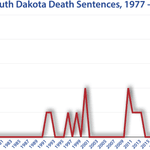
State & Federal
South Dakota

History of the Death Penalty
All executions were carried out by hanging until 1947, when George Sitts was executed by electrocution. Executions since 1976 have used lethal injection.
Timeline
1877 — Jack McCall becomes the first person executed by the government in the territory that is now South Dakota.
1915 — South Dakota abolishes the death penalty.
1939 — The death penalty is reinstated with electrocution as the only method of execution.
1979 — The death penalty is reinstated following the U.S. Supreme Court’s decision in Furman v. Georgia.
1984 — Lethal injection is first available as a method of execution in South Dakota.
2018 — Charles Rhines asks U.S. Supreme Court to review his case and to rule that it is unconstitutional for jurors to impose the death penalty based on anti-gay animus and stereotypes.
2019 — The U.S. Supreme Court declines to review the case of Charles Rhines, despite juror’s anti-gay statements and reliance on homophobic beliefs in deciding to sentence him to death.
2020 — The Senate Judiciary Committee votes down a bill that would have prohibited the use of the death penalty against individuals with severe mental illness.
2021 — A South Dakota state senators introduces a bill that would restrict capital punishment to premeditated murders in which a defendant kills a police officer, corrections officer, or firefighter during the performance of their official duties. The bill would also limit the death penalty to the actual perpetrator of the crime.
Famous Capital Cases
The first person executed by the government in the land that is now South Dakota was Jack McCall, the man convicted of killing Wild Bill Hickok. The execution happened in 1877.
The second person executed in the land that is now South Dakota was Thomas Egan, who was convicted of killing his wife. He was “hanged” three times on the 13th of July 1882; the rope broke on the first attempt, and on the second attempt the rope did not break his neck. Only on the third attempt did the execution go as planned. Years later, his stepdaughter admitted to committing the crime when she was on her death bed.
In 2001, Elijah Page and Briley Piper pleaded guilty to the torture-murder of Chester Allan Poage. They were both sentenced to death by a judge. Darrell Hoadley chose to plead innocent to the murder and was convicted by a jury. Though he was found to have the same aggravating factors against him, a split sentencing jury led to him receiving life in prison. Page chose to end his appeals and was executed in 2007. Piper challenged his death sentence and had his death sentence vacated. He is scheduled to be re-sentenced by a jury in July of 2011.
Milestones in Abolition/Reinstatement
Fourteen people were executed in what is now South Dakota before the death penalty was abolished in the state in 1915.
The death penalty was reinstated, with execution by electric chair as the only method, in 1939. One person, George Sitts in 1947, was executed before the death penalty was found to be unconstitutional by the United States Supreme Court in 1972.
Other Interesting Facts
In 1984, South Dakota law was changed to provide for execution by lethal injection.

Resources

South Dakota Execution Totals Since 1976
News & Developments
News
Feb 23, 2022
Kentucky and South Dakota Advance Bills to Bar Death Penalty for People with Severe Mental Illness
Bills that would exempt individuals with severe mental illness from the death penalty have taken major steps forward in the Kentucky and South Dakota legislatures. The Kentucky House of Representatives voted overwhelmingly (76 – 19) on February 9, 2022, to advance its severe mental illness exemption, HB 269, to the state senate. The South Dakota Senate followed on February 22, voting 21 – 14 to pass SB 159. Both bills have Republican…
Read MoreNews
Jan 26, 2021
Former South Dakota Prosecutor and Judge Introduces Bill to Limit the State’s Death Penalty
A South Dakota state senator who previously served as a prosecutor and a state court judge has introduced a bill to limit the breadth of the state’s death penalty statute. Senate Bill 98, introduced by Senate Judiciary Committee Chairman Arthur Rusch (R – Clay, pictured) on January 25, 2021, would restrict capital punishment to a single aggravating circumstance, premeditated murders in which a defendant killed a police officer,…
Read MoreNews
Oct 12, 2020
Capital Case Roundup — Death Penalty Court Decisions the Week of October 5, 2020
NEWS (10/5/20) — Washington, D.C.: The 2020 – 2021 U.S. Supreme Court term opened on October 5 with the Court declining to review challenges to more than 30 death-penalty court…
Read MoreNews
Nov 04, 2019
South Dakota Prisoner Executed After Supreme Court Denies Review of Anti-Gay Bias, Denial of Mental Health Expert
Whether South Dakota death-row prisoner Charles Rhines (pictured) lives or dies may depend less on whether he was constitutionally convicted and sentenced to death and more on whether the courts value finality more than they value fairness. As Rhines filed two separate petitions in the U.S. Supreme Court and an appeal in the South Dakota Supreme Court on November 1, the South Dakota Department of Corrections announced that…
Read MoreNews
Jun 28, 2019
During National Pride Month, South Dakota Schedules Execution in Case Tainted by Anti-Gay Bias
In the midst of National Pride Month commemorating the 50th anniversary of the Stonewall Riots and the birth of the modern LGBTQ rights movement, South Dakota has issued a death warrant seeking to execute a gay man whose death sentence was tainted by anti-gay bias. Charles Rhines (pictured) was sentenced to death by a jury that, according to juror affidavits, was influenced by bigoted stereotypes in reaching its decision. On June 25,…
Read More

